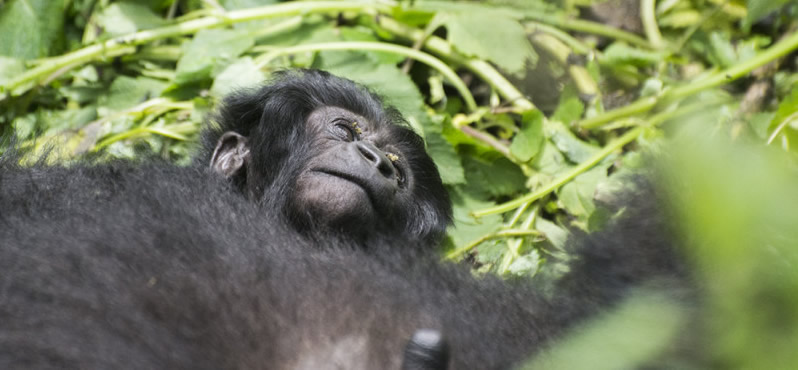In Volcanoes National Park, Rwanda, the silver back of Sabyinyo group, Gihishamwotsi, was observed by park personnel with signs of respiratory illness, including coughing and nasal discharge, lethargy and poor appetite, prompting Gorilla Doctors veterinarians to take a closer look.
On March 28, when Gihishamwotsi’s status was reported to be deteriorating, Drs. Noheli Jean Bosco, Gaspard Nzayisenga and Joost Philippa visited the group. After observing Gihishamwotsi, the team determined that antibiotic therapy would likely help alleviate his illness. Drs. Noheli and Gaspard administered a shot of antibiotics that day.
Gorilla Doctors veterinarians also observed that some of the other gorillas of the group were now also showing signs of illness. Our team and Volcanoes National Park authorities made a plan to return the next day to re-assess the group.
When the team returned, Elizabeth Nyirakaragire, Volcanoes National Park’s veterinary technician, reported that Gihishamwotsi’s respiratory rate was still high, but the frequency of his cough had diminished and appetite had improved a bit. However, two other gorillas (Silver back Guhonda and female Umurinzi) were showing signs of a soft cough, and Ganza, an infant, was seen with a dry nasal discharge.
The team visited the group again on March 30 to once again assess the situation. Gihishamwotsi was the first gorilla spotted as he led the others out of a thick bamboo forest where they had apparently spent a night.
His health appeared to have significantly improved since the medical intervention, although he was still coughing somewhat. His appetite was greatly improved and his abdomen was three-quarters full. It appears he had responded well to Gorilla Doctors’ treatment.
Infant Ganza and silver back Guhonda were behaving normally by this time, with no signs of respiratory issues or lethargy. The rest of the group appeared to be in good visual health as well.
In total, 12 of the 16 gorillas in Sabinyo group were affected by this respiratory disease outbreak; all have been making steady recoveries, (two animals still have soft coughs) but Gorilla Doctors and park staff continue to monitor them closely.
Meet Gorilla Doctors’ New Health Care Manager at the Lwiro Primate Sanctuary
Gorilla Doctors is happy to announce our latest hire, Dr. Sophie Bosh, who will manage the health care program at the Lwiro Primate Sanctuary. Gorilla Doctors was recently asked by partners to provide leadership for health care for animals at Lwiro.
As an introduction, we asked Sophie, who studied veterinary medicine at the University of Utrecht in the Netherlands, a few questions about herself. Check out her answers below. She loves to write, so watch for her name on future blog posts. She should have some great stories and insights to share from Lwiro. Feel free to welcome Sophie in the comments.
What attracted you to this role with Gorilla Doctors?
I have been following the work of the Gorilla Doctors with great interest for many years. Great apes are on the brink of extinction and I have always wanted to become a part of their conservation. This specific role offered by Gorilla Doctors attracted me because it involves veterinary capacity building in the region and setting up a thorough health care program for great apes and other primates in a sanctuary setting, which I have gained much experience with over the past few years working for the Lilongwe Wildlife Center, the Laos Wildlife Rescue Center and participating at the Zambia Chimp Project at Chimfunshi Wildlife Orphanage.
What do you find most interesting about the health care program?
The health care program of the Gorilla Doctors is set up from a One Health perspective. Within this program, preventative medicine plays a key role, which I find most interesting. It involves analyzing potential health or disease risks and reducing these risks through preventative methods. This is involves setting up hygiene protocols, quarantine procedures, and providing preventative veterinary care to the animals.
In your time working with great apes, do you have a memory or story that stands out?
After graduating from vet school, I got into contact with the International Primate Heart Project in the UK; their research is focused on cardiac disease in great apes. I helped them connect their project with Dutch zoos and assisted them on various occasions with data collection, performing echo cardiography on several chimpanzees and gorillas. It was my first time working with gorillas and I felt very privileged to be a part of that project and i want to experience gorilla tours in Rwanda, Uganda & DRC Congo.

